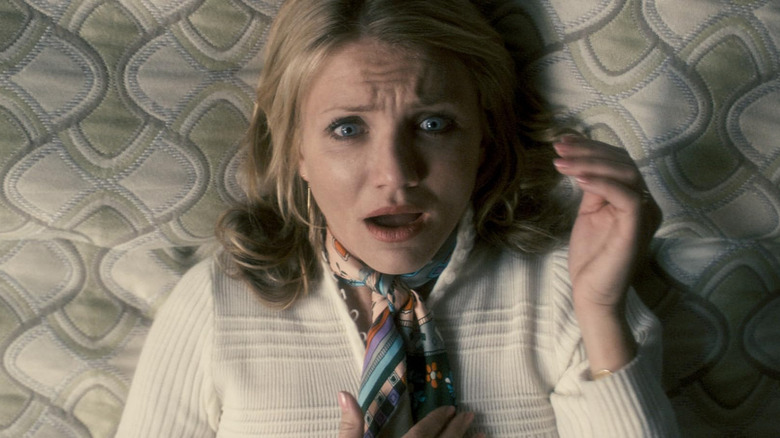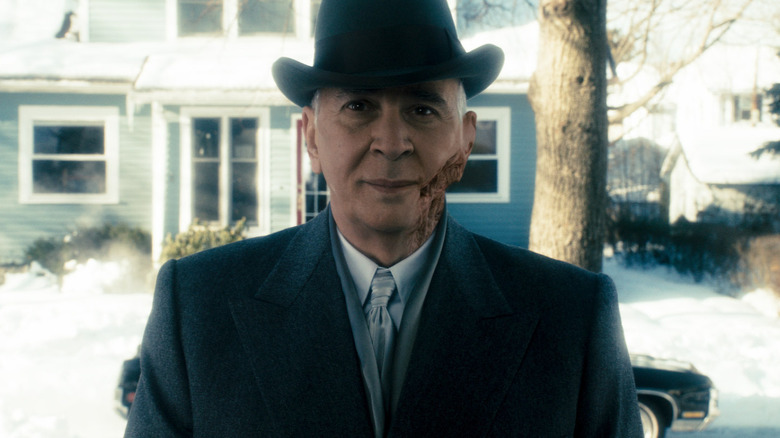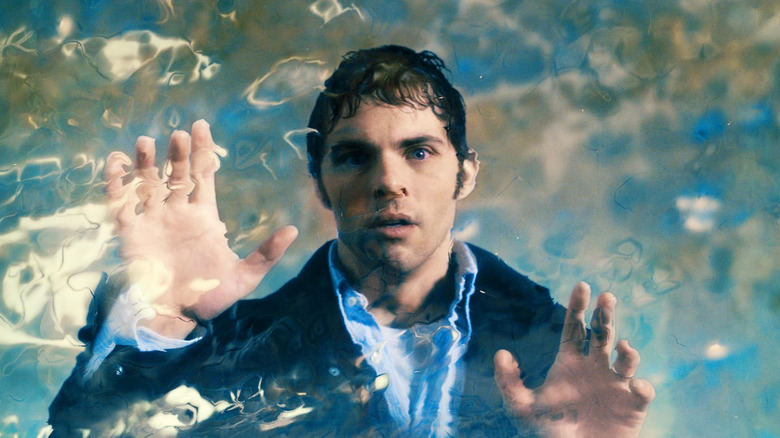This Cameron Diaz Sci-Fi Flop Is A Feature-Length Twilight Zone Episode
When filmmaker Richard Kelly made his feature directorial debut "Donnie Darko" in 2001, it caused a stir in the arthouse world. "Donnie Darko" quickly accumulated a passionate cult who fell in love with its unbalanced hero (Jake Gyllenhaal) and its twisted time-travel plot. It was a combination psychological horror film and bizarro indie coming-of-age-in-the-1980s tale. Unsurprisingly, it only took a few additional years for "Donnie Darko" to become a regular staple on the midnight movie circuit, with fans dressing up as the film's enigmatic Frank the Bunny on Halloween.
The cult success of "Donnie Darko," however, seemingly went to Kelly's head as he appeared to become very, very convinced of his own importance as a new artistic voice in the indie film world. It took five years, but he eventually returned to theaters with the utterly gonzo "Southland Tales," an epic and ambitious film about the horrors of the George W. Bush administration. "Southland Tales" boasted a huge cast and told a story of a near future where porn was the world's biggest commodity, war was ranging everywhere, and time-traveling rebel groups congregated in Venice, California. The film notoriously bombed and its quality is hotly contested. Some critics love its ambition, while others bristle as its sloppy, sprawling narrative and weird ideas.
After that, Kelly was humbled and scaled back his ideas a little bit. In 2009, he returned with his third (and, to date, most recent) feature film "The Box." Based on the short story "Button, Button" by regular "Twilight Zone" contributor Richard Matheson, "The Box" starred James Marsden and Cameron Diaz as an average suburban couple in 1976 who receive a ... mysterious offer from the equally mysterious fellow named Arlington Steward (Frank Langella).
"The Box" must have also humbled Kelly, as the $30 million movie barely broke even at the box office.
The Box barely broke even at the box office
Matheson's original story was published in Playboy in 1970 and featured a tantalizing premise: a woman named Norma is visited by a stranger holding a wooden box with a button on it. The stranger explains that if she pushes the button, she will receive $50,000, but also that someone she doesn't know will die. Norma pushes the button, and receives the $50k ... but as an insurance payment after her husband dies. Norma points out that the death was supposed to be someone she didn't know. The ironic response: "Did you really know your husband?"
"The Box" expands the premise slightly. Norma (Diaz) and her husband Arthur (Marsden) both have high profile jobs that they are on the cusp of losing. (She's a professor and he designs cameras for Mars probes.) The mysterious stranger, Arlington Steward, arrives with the titular box, sporting a large red button on it. The cash offer is now $1 million and they have 24 hours to decide if they want to kill someone they don't know.
Norma pushes the button without Arthur's consent, leading to a wild dash to return the $1 million prize, but also a deep investigation into who Arlington might be, who he might be working for, and how the button works. There are all kinds of weird shadowy conspiracies and secret spies in Norma's and Arthur's lives, including a revelation involving advanced alien technology. There are also a few repetitions of the old saw about super-advanced technology looking like magic to more primitive individuals.
There is then another ethical choice involving Arthur and Norma's son (who has been injured in an accident), a magical button that can restore him, and the need for a blood sacrifice. It all connects to a "Twilight Zone" or "Star Trek"-like alien plot about humanity's moral worth.
The Box wasn't well-reviewed either
"The Box" wasn't well-reviewed (although it certainly has its defenders). Most critics felt that Kelly's film was padded and nonsensical, unduly expanding on its very simple sci-fi premise. Incidentally, "Button, Button" also served as the inspiration for an episode of the 1985 revival of "The Twilight Zone" directed by Peter Medak. That version starred Mare Winningham and Brad Davis. "The Box," meanwhile, only has a middling 42% approval rating on Rotten Tomatoes based on 153 reviews. Peter Bradshaw, writing for The Guardian, gave the film one star, calling it a "pop video to a prog-rock track from hell, padding things out to feature length with all sorts of incredible gibberish and extraneous nonsense."
The premise of "The Box" was never meant to sustain a feature film or any lengthy narrative, really. Indeed, the story only serves as an invitation for discussion, a dramatization of the Trolley Problem. If you could instantly receive a huge, tax-free cash windfall, but you would have to murder a stranger by proxy, would you do it? And if you accepted, what sort of ironic cosmic fate would you be welcoming onto yourself (as such decisions cannot be made with some sort of karma at play)?
Kelly has only produced one film since "The Box" came out (the 2010 action/comedy film "Operation: Endgame") and has put several ambitious films into production, only for all of them to stall out. Kelly once said he would like to make a sequel to "Donnie Darko," but admitted he doesn't have the rights to do so; the extant sequel "S. Darko" was made without his input. Whether or not Kelly will re-emerge in the pop consciousness remains to be seen, but until further notice "The Box" remains his final film as a director.


